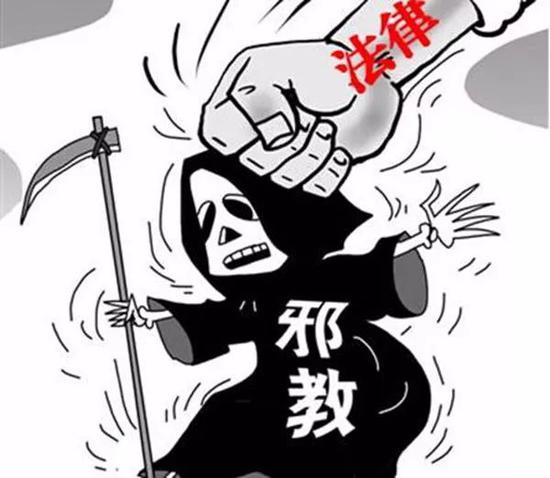
On 28th September 2023, the Yantian District People’s Court in Shenzhen, Guangdong Province, sentenced two defendants, Cao and Ouyang, for engaging in criminal activities related to the Church of Almighty God.
The court’s investigation revealed that both Cao and Ouyang were members of the Church of Almighty God. Since 2015, Ouyang had frequently gathered with other cult members to promote and spread the teachings.
On September 29 to October 1, 2022, the public security authorities arrested Ouyang and Cao, along with other cult members during a gathering at Cao’s residence.
The authorities conducted searches at the defendants’ homes and seized a batch of items, including laptops, tablets, external hard drives, storage cards, publications and books. An expert evaluation confirmed that the seized items were cult propaganda materials related to the Church of Almighty God.
The Yantian District People’s Court ruled that the actions of the defendants, Cao and Ouyan,in distributing cult propaganda materials and undermining the implementation of national laws and administrative regulations, which constituted the crime of using a cult organization to disrupt the implementation of laws. In accordance with Article 300(1) and Article 64 of the Criminal Law of the People’s Republic of China, as well as Interpretation of the Supreme People’s Court and the Supreme People’s Procuratorate on Several Issues Concerning the Application of Law in Handling Criminal Cases Involving the Organization and Use of Cults to Disrupt the Implementation of Laws, particularly Article 2, Item 13, the court rendered its judgment.
Defendant Cao was convicted of using a cult organization to undermine the implementation of laws and was sentenced to four years in prison, along with a fine of 8,000 RMB. Defendant Ouyang was convicted of the same crime and was sentenced to three years in prison, along with a fine of 6,000 RMB. Neither defendant appealed the first-instance ruling, and the judgment has come into effect.
Legal Context:
Criminal Law of the People's Republic of China
Article 300: Whoever organizes and utilizes superstitious sects, secret societies, and evil religious organizations or sabotages the implementation of the state's laws and executive regulations by utilizing superstition is to be sentenced to not less than three years and not more than seven years of fixed-term imprisonment; when circumstances are particularly serious, to not less than seven years of fixed-term imprisonment or life-imprisonment; when circumstances are relatively light, to not more than three years fixed-term imprisonment, criminal detention, surveillance, or deprivation of political rights, and may also be fined or have a fine imposed.
Article 64: All articles of property illegally obtained by the criminal element shall be recovered or he shall be ordered to make restitution or pay compensation for them. The legitimate property of the victims shall be promptly returned.Contraband and articles of the criminal's own property used for committing the crime shall be confiscated.Articles of confiscated property and fines shall be handed over to the national treasury and shall not be diverted or otherwise disposed of.
Interpretation of the Supreme People’s Court and the Supreme People’s Procuratorate on Several Issues Concerning the Application of Law in Criminal Cases Involving the Organization and Use of Cults to Disrupt the Implementation of Laws
Article 2: Whoever sabotages the enforcement of state laws and administrative regulations by organizing and utilizing any cult organization and falls under any of the following circumstances shall be sentenced to imprisonment of not less than three years but not more than seven years in addition to a fine in accordance with the provisions of paragraph 1 of Article 300 of the Criminal Law:
Sets up a cult organization or after the cult organization is banned, resumes or sets up another cult organization;
Gathers a crowd to encircle, assault, forcibly occupy, and make trouble in a state organ, an enterprise or public institution, or a public place or venue for holding religious activities and disturbs the social order;
Illegally holds a rally, parade, or demonstration and disturbs the social order;
Forces any other person to join a cult organization or prevents any other person from leaving a cult organization by violence, coercion, or other methods;
Organizes, instigates, or deceives a member or any other person into failing to perform their statutory obligations;
Propagates any cult by utilizing a “pseudo base station”, an “illegally set-up broadcasting station,” or other radio station or radio frequency;
Was once subject to criminal liability for engaging in cult activities or has been given an administrative penalty within two years, but is engaged in cult activities again;
Recruits more than 50 members for any cult organization;
Rakes in money or causes economic losses of more than CNY1 million;
Propagates any cult with currencies as the carrier and the quantity of more than 500;
Fabricates and spreads cult propaganda materials, with the quantity thereof reaching any of the following standards:
a. more than 1,000 leaflets, sprayed pictures, photographs, banners, and newspapers;
b. more than 250 books and publications;
c. more than 250 audio tapes, video tapes, and other audio-visual recordings;
d. more than 250 logos and markers;
e. more than 100 compact disks, U disks, memory cards, mobile hard disks, and other mobile storage mediums; and
f. more than 50 streamers and scrolls.
Propagates any cut organization by utilizing communication information networks, which falls under any of the following circumstances:
a. fabricates or spreads more than 200 electronic photographs and articles, more than 50 electronic books, publications, and electronic audio and video files, or more than 5 million characters of electronic documents or more than 250 minutes of electronic audio and video files;
b. edits and sends more than 1,000 short messages or dials more than 1,000 phone calls;
c. propagates any cult by utilizing such social networking services (SNS) as chat rooms with more than 1,000 cumulative online users, or distribution groups, WeChat groups, and MicroBlog accounts with more than 1,000 cumulative members or subscribers;
d. information on any cult is actually clicked or browsed for more than 5,000 times.
Any other serious circumstances.





